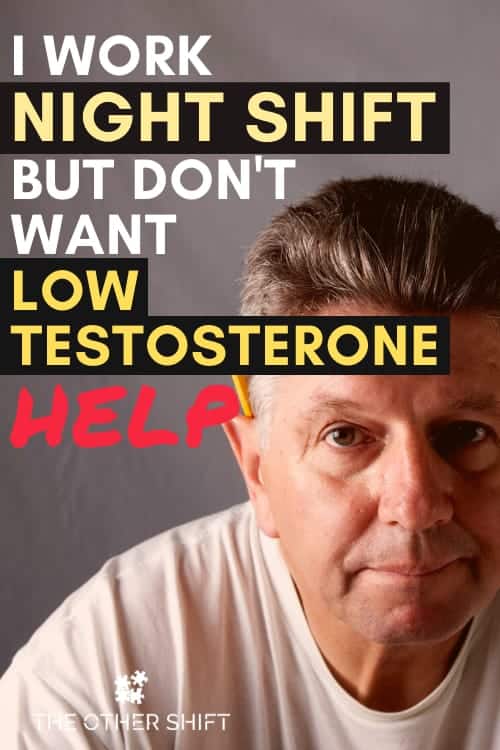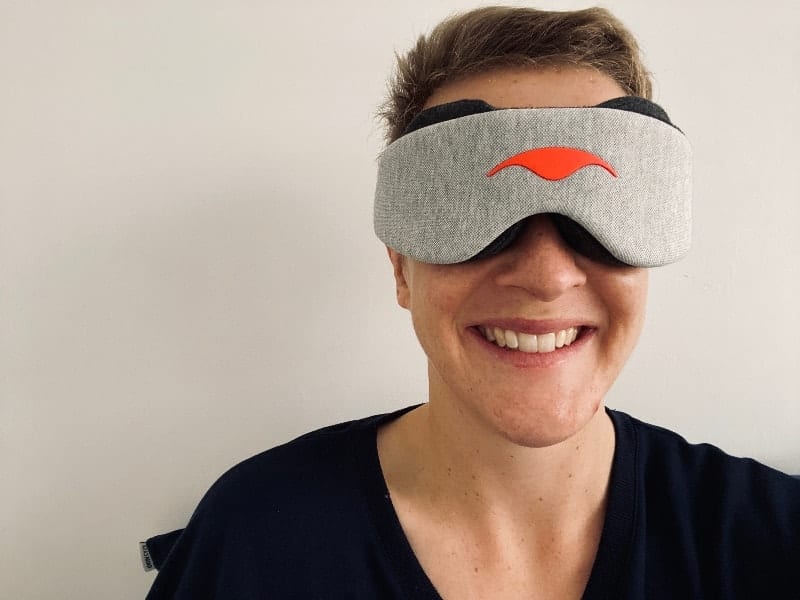Disclosure: This page may contain affiliate links, meaning we receive a commission if you decide to make a purchase through our links, but this is at no additional cost to you. Please read our disclosure and privacy statement for more info.
Working odd hours and night shifts? Your hormone levels could be paying the price. For men, testosterone is a concern, as it helps increase muscle and bone mass, sexual characteristics and hair growth. So could your night shifts be causing you problems in these areas?
Testosterone levels of male night shift workers might be negatively impacted due to chronic disruption of their circadian rhythm. However, a solid sleep routine, a healthy diet and regular exercise, aids significantly in testosterone production. Hormone replacement therapy may also be an option.

Studies have shown an increased risk in breast cancer for female shift workers and a decrease in testosterone levels for men, resulting in low sperm count and erectile dysfunction. And while skipping your night shift might sound appealing, there are ways to combat these negative side effects, maintaining your schedule while simultaneously keeping your hormones in check.
Hormones and Shift Work
So what’s the deal with hormones anyway?
Our hormones are like messengers, sending signals all around the body to perform various functions.
From digesting our food to managing our stress, to letting us know when it’s time to rest – it’s up to our hormones to keep the balance, ensuring all systems go. (source)
When our hormones go awry, due to stress or environmental factors, these signals miss their mark or stop altogether, causing unwanted physical and mental symptoms.
If you’ve ever experienced skin issues, bloating, mood swings, brain fog, digestion issues, or any other unpleasant symptoms, you were probably experiencing a hormonal imbalance.
For shift workers, the most obvious system that gets disrupted is, of course, our sleep-wake cycle, or our circadian rhythm. And, as you’ll find out, the circadian rhythm directs all other systems and the production and release of all other hormones.
And when this is under chronic disruption, it could lead to devastating effects. Our circadian rhythm is signaled by the hormone, melatonin.
Melatonin production is often synchronized to the external environment. Meaning levels of melatonin are low during the day when it’s light out, and higher at night when it gets darker. But, for the shift worker, this cycle is reversed. We need melatonin to be higher in the morning when our shift ends, and lower at night as we head into work.
[VIDEO] – Thinking about taking a melatonin supplement? Watch Em first.
Chronic disruption of our circadian rhythm, which is very common among shift workers, will have a ripple effect, leading to hormone imbalances and more severe health issues. And when one too many night shifts get in the way of having a decent sleep cycle, we can develop what is called Shift Worker Sleep Disorder, or SWSD.
If left unaddressed, this could mean a drastic drop in testosterone levels for men and a drastic increase in estrogen for women.
According to the Cleveland Clinic, shift workers account for about 20% of the full-time workforce. Therefore, this population is at high risk for this ripple effect of disorders, from acute sleep disorders to chronic inflammation and cancer.
Related: Does Night Shift Shorten Your Life? 10 Impacts of 3rd Shift
Luckily, there are steps that can be taken to combat these issues. In the short term, it’s recognizing the ramifications of less than ideal sleep patterns, putting the tools in place to correct them, and understanding the risks of long-term hormone disruption.
Have you ever had a rough night of sleep and experienced a strange appetite the next day?
This is because poor sleep can lead to increased levels of ghrelin, the hunger hormone, and decreased levels of leptin, the hormone that tells our brains when we are full. (source)
What about that constant fight or flight feeling?
This could be due to cortisol, the stress hormone. This hormone gets released when our bodies need to address and adapt to a stressful situation. However, once the situation has passed, levels go down and balance back out. But for the sleep deprived individual, levels never quite go back to normal, leaving us in a constant state of unrest and fight or flight.
Sleep is key to everything we do. And when sleep is disrupted, it starts a chain reaction that sends all other systems off balance.
This is why it is common for shift workers to fall victim to these disruptions. And unfortunately, for both men and women, this means disrupting our sex hormones. For men, if you’ve ever struggled to lose weight or experienced erectile dysfunction, you could have a testosterone deficiency.
Here are a few sleep posts to direct you in the right direction.
- Can’t Sleep After Night Shift? 13 Weird Tips That Actually Work
- How To Sleep Fast In 5 Minutes. 13 Tips To Get You There
- Shift Work Bedroom Ideas: Create the Ultimate Sleeping Oasis

The Role of Testosterone
Testosterone is a sex hormone that plays an important role in our bodies.
For men, testosterone regulates bone density, muscle mass and libido.
Testosterone is also responsible for the production of red blood cells and sperm. For men experiencing problems producing enough natural testosterone, this could mean a lack of sex drive, low sperm count, trouble losing weight or gaining muscle and erectile dysfunction.
Why is this relevant for shift workers? Well, those working the graveyard shifts have been shown to experience significant dips in testosterone levels, making them susceptible to these disorders.
[VIDEO] – TESTOSTERONE: How To Increase Testosterone & Its Effects (Naturally Boost Low Levels)
What Causes Testosterone To Drop?
There are a number of reasons why some may experience testosterone deficiencies. Injury, age, a traumatic event and even antibiotics could have an effect on testosterone levels.
But when it comes to shift workers, it is thought the main cause for this drop is due to chronic disruption of sleep patterns. And when it comes to testosterone production, sleep is everything.
According to a study conducted by the University of Chicago Medical Center, peak testosterone production happens during the sleeping hours. If sleep patterns are off or you’re depriving yourself from a good night’s rest, you are depriving your body of peak testosterone production.
What’s more, this could also lead to insomnia, keeping shift workers trapped in this vicious cycle.
Below are some additional symptoms of men with low levels of testosterone:
- Fatigue and low energy overall
- Weight gain
- Loss of lean muscle mass’
- Osteoporosis
- Loss of body hair
- Low libido
- Frequent urination
- Erectile dysfunction
- Poor focus
- Poor memory
Luckily, there are steps that can be taken to address these issues, or prevent them from happening altogether. And like most other things in life, the first step is acknowledging that they exist. (source)
The first thing we can do is think back on our circadian rhythm.
When it comes to sleep, it’s important to think about the quality of sleep you are getting, not just the quantity. We’ve all been told to get our 7-9 hours of sleep, but if that sleep is of poor quality, it’s not going to give your body the restorative time it needs to function. This means focusing on our deep and REM sleep.
As shift workers, there are steps we can take to ensure we are getting the restorative sleep we need, even during the day.
Here are some simple ways to help you get better sleep during the day, ensuring your body maintains its peak testosterone production:
- Limit caffeine intake near bedtime. Caffeine is what keeps many of us going during those long nights. However, if you’re working nights and need to get your sleep from morning until afternoon, avoid that extra cup of coffee and do not take anything 6 hours before you plan to sleep.
- Keep it cool and dark. Just like keeping a dark environment, having one that is on the cooler side will also help your body wind down and your heart rate relax. These black out blinds on Amazon are fantastic. If the setting up blinds in your bedroom is too much fussing around, get yourself an eye mask. The one Em is wearing below from Manta Sleep is phenominal. 100% black out and your eye lases are not squished!
- Naps are your friend. If you’ve had a hard day and know you have to get to your night shift in a few hours, do yourself a favor and try to catch an hour or two of sleep before your shift. Related: The Night Shift Power Nap: What You Need to Know
- Invest in blue light blocking glasses . Our internal clock, our circadian rhythm, is typically synchronized to the external environment. Melatonin is more easily produced when we can convince our brains that it is nighttime and therefore, time for bed. Get some blue light blocking shades and make your bedroom the nighttime escape it needs to be. I’m wear the “classic night swannies” and I love em. Get yourself a pair here.


In addition to sleep, there are a variety of lifestyle changes and medical interventions that can help men experiencing low levels of testosterone.
Some ways men can improve their testosterone levels:
- Create a routine.
While it’s not always possible, try to limit the amount of times you are switching around your work schedule. Our bodies like consistency so it’s important to establish a routine from when we get up to what times we eat to the best of our abilities. Create a schedule for yourself and try to do those things that support healthy hormone function – eating, resting, working out – at the same time every day. If you work permanant nights, here’s a post for you. - Stay active outside of work.
Physical fitness and setting time aside to focus on your own health and wellness is critical to the production of not only testosterone, but helps to regulate cortisol, the stress hormone, and keep our systems properly balanced. Focus on strength training to combat the potential loss of muscle mass and chronic disease. And work in restorative exercises to keep you feeling mentally strong during those long nights.
Related post: Bodybuilding as a 12-Hour Shift Worker: Maximum Muscle Growth - Hormone replacement therapy (HRT).
Men with low testosterone may find it beneficial to start hormone replacement therapy to combat the negative side effects and reintroduce this hormone into the body that should be producing it anyway.
[VIDEO] – If you’re trying to improve your sleep, check out this video we recently published.
Testosterone Replacement Therapy
In a way, hormone replacement therapy, or HRT, is a bit of misnomer. Mostly because those undergoing hormone replacement therapy are not replacing hormones, but rather reintroducing them into a body that is already producing it but should be producing more.
As men age, or as shift workers experience too many long nights, testosterone drops. So undergoing HRT may help men feel better, maintain muscle, and combat erectile dysfunction. Remember, everybody is unique, and everybody responds differently to different treatments.
The most important thing is understanding these risks and working with your own health care providers to develop the right prevention plan for you. If you’re looking for additional support, the National Institute for Occupational Safety and Health (NIOSH) offers a variety of resources specific to shift workers, helping to keep this population safe and productive during their shifts.
Hormones and Your Diet
Our hormones really are the captains in our bodies. And when they get out of balance, it could mean a variety of symptoms ranging from irritating to debilitating.
For shift workers the task of keeping our hormones happy is twice as hard, having an opposite schedule as the majority of those around us. But keeping this balance and mitigating testosterone imbalances is possible.
Exploring hormone replacement therapy might be an option for you, but do try and creating a lifestyle that optimizes healthy hormone production first.
We are what we eat. And we often don’t eat enough. Or rather, we eat too much of the wrong things. But did you know you can eat to support your hormones and testosterone production?
Eating a well-balanced, nutrient rich diet helps men get the vitamins and minerals they need to support healthy hormone production. Some foods like tuna, egg yolks, and beef are all high in protein and vitamin D and can help men struggling to keep maintain adequate levels of testosterone.
Ginger, leafy greens, and pomegranates have all been shown to aid in fertility among men as well.
On the flip side, indulging in too many processed foods, like those in your favorite vending machine, stimulants, or alcohol, could have a negative effect on testosterone production. There is also evidence to suggest avoiding foods packaged in plastic, particularly foods that require you to heat them up in plastic.
While it may be convenient to grab your favorite frozen meal and bring it to your evening rounds, you may want to think twice about popping that in the microwave. Studies have shown ingesting too many of these chemicals, such as BPA from plastic containers, could also reduce levels of testosterone.
Related: Glass vs Plastic Containers. What’s Best For You and Your Food?
Here are a few diet and food-related posts we’ve published you might find helpful.
- Volumetrics Diet: The Pros & Cons for Shift Workers
- Healthy Meals for Shift Workers (with Recipes and Videos)
- 10 Easy Shift Work Meals with Recipes
[VIDEO] – Taking into consideration the food options we mentioned above, not all of them will agree with you overnight. This video may help guide some your food choices.
Summary: I Work Night Shift But Don’t Want Low Testosterone. Help
Night shift workers must understand the possible consequences of working odd hours outside the typical 9-5.
Our bodies and our hormones thrive with consistency. And, while our bodies are very adaptable, we must do what we can to help them keep the balance. Eat well, move often, nail down a routine to the best of your ability, and give your life structure.
When our hormones are balanced and sending the proper signals to keep all systems functioning, we will feel good, perform well, and be able to thrive in our lives. When our hormones are not balanced, we will feel it. And what may start as general fatigue could in fact turn into long-term disease.
Gents, those night shifts won’t work themselves, but it’s up to us to make those odd hours work for us, not against us. Your hormones will thank you.
Cheers,

Disclosure: This page may contain affiliate links, meaning we receive a commission if you decide to make a purchase through our links, but this is at no additional cost to you. Please read our disclosure and privacy statement for more info.
Recent Posts
An examination of the night shift professions, that while sometimes underappreciated, are necessary for civilization, in its current form, to exist. A city can be thought of as a machine. Each...
Culminated from an exhaustive yet well-funded journey into the night, this article will prepare you for life outside of work while being a denizen of the dark. During days off, night shift...

